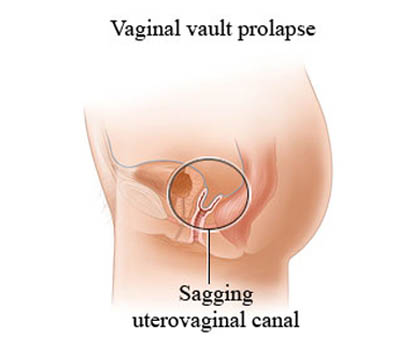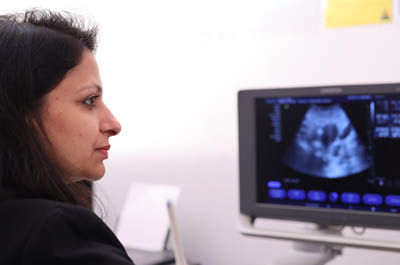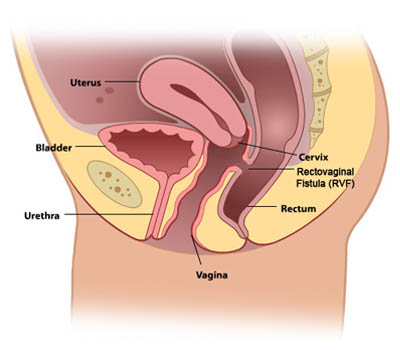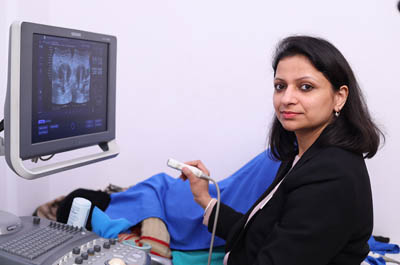
Vault Prolapse: Understanding, Symptoms, Causes, Diagnosis, and Treatment at Precision Gynaecology with Dr. Neha Poddar
Welcome to Precision Gynaecology by Dr. Neha. Our hospital is dedicated to providing expert care for women experiencing gynecological issues, including Vault Prolapse. This condition, which can occur after a hysterectomy, requires specialized attention and treatment to restore normal pelvic function and improve quality of life.
Understanding Vault Prolapse:
Vault prolapse, also known as vaginal vault prolapse, occurs when the top of the vagina (the vaginal vault) descends into the vaginal canal or outside of the vaginal opening. This condition typically arises after a hysterectomy, where the supportive structures of the pelvic floor are weakened or damaged, leading to a downward displacement of the vaginal vault.
Symptoms of Vault Prolapse:
The symptoms of vault prolapse can vary but often include:
-
A feeling of pressure or heaviness in the pelvic area
-
A visible bulge or protrusion from the vaginal opening
-
Discomfort or pain during physical activity or sexual intercourse
-
Difficulty with urination or bowel movements
-
Lower back pain
-
Recurrent urinary tract infections

Causes:
Vault prolapse can be caused by several factors, including:
-
Weakening of the pelvic floor muscles and tissues after a hysterectomy
-
Damage to the pelvic support structures during surgery
-
Chronic straining due to constipation, heavy lifting, or persistent coughing Aging and natural decline in muscle strength and elasticity
-
Genetic predisposition to weaker connective tissues
Diagnosis:
Diagnosing vault prolapse involves a thorough evaluation by Dr. Neha, including:
-
Detailed medical history and symptom assessment
-
Pelvic examination to assess the extent and severity of the prolapse
-
Imaging studies such as ultrasound or MRI to evaluate the pelvic structures
-
Urodynamic tests to assess bladder function if urinary symptoms are present
Treatment Options:
Treatment for vault prolapse depends on the severity of the condition and the patient’s overall health. Options include:
Lifestyle Modifications: Avoiding heavy lifting, managing constipation, and maintaining a healthy weight can help reduce symptoms.
Pelvic Floor Exercises: Strengthening the pelvic floor muscles through exercises (e.g., Kegels) can provide support and reduce prolapse severity.
Pessary: A vaginal pessary is a removable device inserted into the vagina to support the pelvic organs and alleviate symptoms.
Surgical Repair: Several surgical techniques can be employed to correct vault prolapse, including:
-
Sacrocolpopexy: Attaching the vaginal vault to the sacrum using surgical mesh.
-
Sacrospinous Ligament Fixation: Attaching the vaginal vault to the sacrospinous ligament.
-
Transvaginal Mesh Procedures: Using mesh to support the vaginal vault and surrounding tissues.
Importance of Early Diagnosis and Treatment:
Early diagnosis and treatment of vault prolapse are essential to prevent complications and improve quality of life. Without treatment, vault prolapse can lead to chronic discomfort, urinary and bowel dysfunction, and a significant impact on daily activities and emotional well-being. Prompt intervention can restore normal pelvic function and enhance overall health.


Support and Next Steps:
At Precision Gynaecology, Dr. Neha and her team are dedicated to providing compassionate and personalized care for women with vault prolapse. If you are experiencing symptoms or have concerns about your pelvic health, we encourage you to schedule a consultation. Together, we can develop a tailored treatment plan to help you achieve optimal health and well-being.
FAQS
Vault prolapse is a condition that occurs when the top of the vaginal vault (the upper portion of the vagina) descends due to weakened pelvic floor muscles, often following a hysterectomy. Dr. Neha Poddar at Precision Gynaecology specializes in diagnosing and treating this condition to help restore pelvic support and improve quality of life.
Symptoms of vault prolapse may include a sensation of pressure or fullness in the vaginal area, difficulty with bowel movements or urination, and discomfort during sexual activity. In severe cases, there may be visible bulging from the vaginal opening. Dr. Neha Poddar can conduct a thorough examination to determine the extent of the prolapse and recommend appropriate treatment.
Diagnosis involves a detailed medical history review and a physical examination. Dr. Neha Poddar may also use imaging studies, such as ultrasound or MRI, to assess the extent of the prolapse and plan the best course of treatment. Precision Gynaecology is equipped with advanced diagnostic tools to ensure accurate assessment.
Treatment options for vault prolapse include both non-surgical and surgical approaches. Non-surgical options may involve pelvic floor exercises, pessary use, or lifestyle modifications. Surgical options can range from minimally invasive procedures to more extensive reconstructive surgeries. Dr. Neha Poddar will discuss the most suitable treatment plan based on the severity of the prolapse and the patient's overall health and preferences.

Recto-vaginal / Ano-vaginal fistulas: Understanding, Symptoms, Causes, Diagnosis, and Treatment at Precision Gynaecology with Dr. Neha Poddar
Welcome to Precision Gynaecology by Dr. Neha. Our hospital is dedicated to providing comprehensive care for women with complex gynecological conditions, including recto-vaginal and ano-vaginal fistulas. These conditions can significantly impact a woman's health and quality of life, and we are here to offer expert diagnosis, treatment, and support.
Understanding Recto-Vaginal / Ano-Vaginal Fistulas:
A fistula is an abnormal connection between two organs. A recto-vaginal fistula is an abnormal passage between the rectum and the vagina, while an ano-vaginal fistula connects the anus to the vagina. Both types of fistulas can cause significant discomfort and complications, including the involuntary passage of stool or gas through the vagina.
Symptoms of Recto-vaginal / Ano-vaginal fistulas:
Symptoms of recto-vaginal and ano-vaginal fistulas can include:
-
Passage of stool or gas from the vagina
-
Foul-smelling vaginal discharge
-
Recurrent vaginal or urinary tract infections
-
Irritation or pain in the vaginal and perineal areas
-
Fecal incontinence
-
Discomfort or pain during sexual intercourse

Causes:
Recto-vaginal and ano-vaginal fistulas can be caused by several factors, including:
-
Obstetric trauma during childbirth, particularly with prolonged or obstructed labor
-
Surgical complications, especially after pelvic surgeries
-
Inflammatory bowel diseases such as Crohn's disease
-
Radiation therapy for pelvic cancers
-
Infections or abscesses in the pelvic area
-
Trauma or injury to the pelvic region
Diagnosis:
Accurate diagnosis of recto-vaginal and ano-vaginal fistulas is essential for effective treatment. Dr. Neha utilizes a comprehensive approach, including:
-
Detailed medical history and symptom assessment
-
Pelvic examination to identify the fistula and assess its severity
-
Imaging studies such as MRI, CT scans, or contrast studies to visualize the fistula tract
-
Endoscopic procedures such as sigmoidoscopy or colonoscopy to examine the rectum and anus
Treatment Options:
Treatment for recto-vaginal and ano-vaginal fistulas typically involves surgical intervention to repair the abnormal connection. The specific approach depends on the size, location, and cause of the fistula, as well as the patient's overall health. Treatment options include:
Conservative Management: Small fistulas identified early may be managed with dietary modifications, antibiotics, and stool softeners to promote healing. Surgical Repair: Several surgical techniques can be employed to close the fistula, including:
-
Primary Repair: Direct closure of the fistula tract.
-
Advancement Flap: Using a tissue flap from nearby areas to cover and close the fistula.
-
Seton Placement: A surgical thread placed to aid in fistula drainage and promote healing.
-
Diversion Surgery: Temporary creation of a colostomy to divert stool away from the fistula site and allow healing.
Postoperative Care: Careful monitoring, antibiotics to prevent infection, and follow-up visits to ensure proper healing and assess for recurrence.
Importance of Early Diagnosis and Treatment:
Early diagnosis and treatment of recto-vaginal and ano-vaginal fistulas are crucial to prevent complications and improve quality of life. Without treatment, these fistulas can lead to chronic infections, severe discomfort, and significant impacts on daily activities and emotional well-being. Prompt intervention can restore normal function and enhance overall health.


Support and Next Steps:
At Precision Gynaecology, Dr. Neha and her team are dedicated to providing compassionate and personalized care for women with recto-vaginal and ano-vaginal fistulas. If you are experiencing symptoms or have concerns about your pelvic health, we encourage you to schedule a consultation. Together, we can develop a tailored treatment plan to help you achieve optimal health and well-being.
FAQS
Recto-vaginal and ano-vaginal fistulas are abnormal connections between the rectum or anus and the vagina, respectively. These conditions can lead to the passage of stool or gas through the vagina, causing discomfort and infections. Dr. Neha Poddar at Precision Gynaecology specializes in diagnosing and treating these complex conditions to restore normal function and comfort.
These fistulas can result from childbirth injuries, surgical complications, inflammatory bowel disease, radiation therapy, or infections. Dr. Neha Poddar will perform a comprehensive evaluation to identify the underlying cause and tailor the treatment plan accordingly, ensuring the best possible outcome for each patient.
Diagnosis involves a thorough medical history review, physical examination, and possibly imaging studies such as MRI or CT scans. Dr. Neha Poddar may also perform a fistulogram or endoscopic examination to precisely locate and assess the fistula, ensuring an accurate diagnosis and effective treatment plan at Precision Gynaecology.
Treatment options vary depending on the size, location, and cause of the fistula. They may include conservative management, such as antibiotics and dietary changes, or surgical interventions to repair the fistula. Dr. Neha Poddar will discuss the most appropriate treatment options with you, aiming to resolve the fistula and improve your quality of life. Surgical options may range from minimally invasive procedures to more complex reconstructive surgeries, all performed with precision and care at Precision Gynaecology.
- General Gynae
- Menstrual Disorders
- Vaginal discharge
- Cervical Cancer - Screening & Vaccination
- Pelvic inflammatory disease (PID)
- Infertility treatment (IVF & IUI)
- Uterine polyps
- Septate Uterus (Uterine Septum)
- Uterine Fibroids
- Ovarian Cysts
- Dermoid Cysts
- Ectopic Pregnancy
- Endometriosis
- Menopause
- Hormonal Disorders
- PCOS and Hyperprolactinemia
- Gynae Endoscopy
- Uro Gynae
Are you seeking a qualified and experienced gynecologist and obstetrician in Ghaziabad? Look no further than Dr. Neha Poddar!
- Call 9318413696, 9958170476
- Whatsapp 9318413696

Doctors
-

Dr. Madhu Poddar
-

Dr. R.K. Poddar
-

Dr. Neha Poddar
-

Dr. Rahul Poddar